Low Cycle Fatigue Testing
We have extensive experience across a wide range of industries
Low Cycle Fatigue (LCF) Testing Sample Preparation
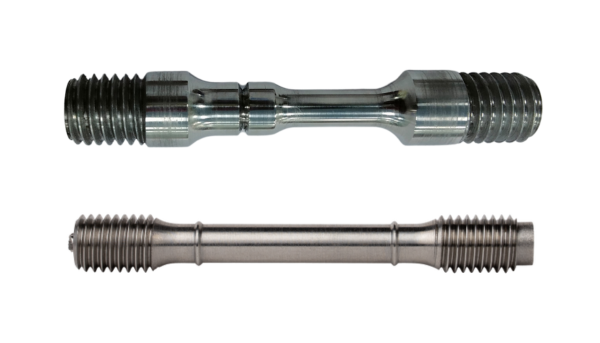
At MIC Labs, precise sample preparation is essential for accurate and repeatable test results in Low Cycle Fatigue (LCF) Testing. LCF testing involves high strain levels, so specimen preparation must be carefully controlled to ensure consistency and reliability.
MIC Labs established a dedicated sample preparation workshop in 2023, which has developed into a machining center capable of extracting, shaping, and polishing test specimens according to ASTM, ISO, and IS testing standards.
Importance of Sample Preparation in LCF Testing
LCF testing applies cyclic loading at high strain levels, causing plastic deformation and eventual failure. Proper sample preparation ensures:
- Precise geometric tolerances
- Minimal residual stress and work hardening
- Consistent surface finish to prevent premature failure
- Compliance with standardized testing methods
Sample Extraction and Machining
Material Selection and Cutting
Specimens are extracted from raw materials or components using precision machining to preserve the microstructure.
Cutting processes such as CNC milling, turning, and wire EDM avoid excessive heat generation.
Machining and Dimensional Accuracy
CNC machining and precision grinding shape specimens according to standardized geometries (round, flat, or notched).
Tight tolerances prevent stress concentration and fatigue behavior changes.
Threaded or smooth grips are added based on test requirements.
Surface Preparation and Finishing
Surface finish affects fatigue life, as rough surfaces can initiate micro-cracks.
Polishing and Surface Treatments
- Specimens are polished with fine abrasives for a smooth surface.
- Surface roughness is controlled within 0.2 – 0.8 µm Ra, per ASTM E606 and ISO 12106.
- Electropolishing removes any machining-induced surface damage.
Residual Stress Relief
Some materials undergo stress-relief treatments to minimize residual stresses.
Dimensional Inspection
Specimens are verified using CMM (Coordinate Measuring Machines) and optical scanners.
Customization for Industry-Specific Needs
Specimens are prepared for various industries, including:
- Aerospace and Defense: Jet engine components, turbine blades, and structural alloys.
- Automotive: Engine components, suspension parts, and drivetrain materials.
- Manufacturing & Power Plants: Structural steels and high-temperature alloys.
- Academic and R&D Programs: Specialized material studies.
High-Volume Testing Capability
The in-house machining workshop enables MIC Labs to:
- Handle high-volume specimen preparation
- Deliver consistent, high-quality specimens on time
- Reduce external dependencies and speed up testing processes
Compliance with International Testing Standards
MIC Labs follows global standards for LCF testing, including:
- ASTM E606 / ISO 12106 – Strain-controlled fatigue testing of metals
- ASTM D3479 – Fatigue testing of polymer matrix composites
- ISO 12107 – Fatigue testing methodologies for design applications
Low Cycle Fatigue (LCF) Testing Sample Preparation – FAQs
1. Why is sample preparation important for Low Cycle Fatigue (LCF) testing?
Sample preparation plays a critical role in ensuring accurate and repeatable LCF test results. Properly prepared specimens help maintain:
- Consistent geometry and tight tolerances
- Minimized residual stress and surface defects
- Compliance with ASTM and ISO standards
- Reliable fatigue life predictions
2. What machining techniques are used for LCF specimen preparation?
LCF specimens are prepared using advanced machining processes such as:
- CNC Milling and Turning: For precise shaping of round or flat specimens
- Wire EDM (Electrical Discharge Machining): For minimal heat-affected zones
- Grinding and Polishing: To achieve a smooth surface finish and eliminate micro-cracks
- Electropolishing: To remove any machining-induced residual stresses
3. How does surface finish affect LCF test results?
Surface roughness influences crack initiation and fatigue life. A smooth finish helps prevent premature failure due to stress concentrations. At MIC Labs, specimens are polished to 0.2 – 0.8 µm Ra in accordance with ASTM E606 and ISO 12106 to ensure reliable test results.
4. What factors are considered when selecting LCF test specimens?
Several factors influence specimen design and selection, including:
- Material type: Metals, polymers, composites, and alloys
- Strain range: High-strain applications require precise geometry
- Test conditions: Temperature, environment, and loading type
- Industry requirements: Aerospace, automotive, manufacturing, and R&D
5. How does MIC Labs ensure quality control in sample preparation?
MIC Labs follows a strict quality control process to ensure specimen accuracy:
- Dimensional Inspection: Using Coordinate Measuring Machines (CMM)
- Surface Roughness Measurement: To verify the required Ra values
- Residual Stress Analysis: Using non-destructive techniques if necessary
- Compliance Checks: Following ASTM and ISO standards for fatigue testing
By maintaining strict sample preparation protocols, MIC Labs ensures accurate and repeatable LCF testing results for various industries.
Sample preparation plays a critical role in ensuring accurate and repeatable LCF test results. Properly prepared specimens help maintain:
- Consistent geometry and tight tolerances
- Minimized residual stress and surface defects
- Compliance with ASTM and ISO standards
- Reliable fatigue life predictions
Low Cycle Fatigue (LCF) Testing Gripping Process
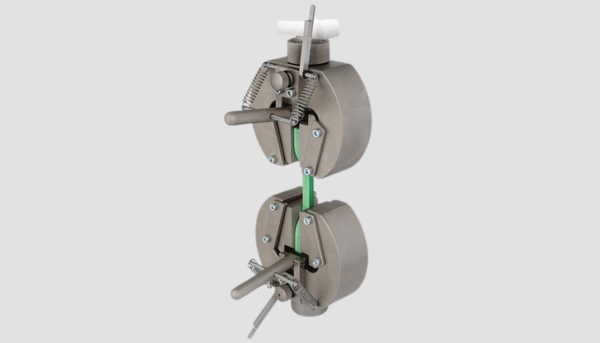
The gripping process in Low Cycle Fatigue (LCF) testing is crucial for ensuring accurate and repeatable results. Proper gripping helps prevent issues like slippage, misalignment, and stress concentration, which can impact the fatigue life of the specimen. Since LCF testing involves cyclic loading with high strain amplitudes, the grips must provide a firm and uniform hold to avoid premature failure.
Various types of gripping systems are used based on the specimen’s shape, material, and test conditions. Threaded grips are commonly used for cylindrical specimens, where external or internal threads allow secure fastening. Collet grips provide uniform clamping force around the specimen and reduce stress concentration. Hydraulic grips use pressurized oil or air to apply a consistent gripping force, making them suitable for high-precision tests. Wedge grips have a self-tightening mechanism that ensures a firm hold, mainly used for flat or rectangular specimens. Pin-loaded grips involve inserting pins through holes in the specimen, minimizing stress concentration and ensuring stable loading.
Alignment and centering play a key role in gripping, as any misalignment can introduce unwanted bending stresses. The gripping surfaces must be smooth and parallel to ensure even pressure distribution. The material and coating of the grips also matter, as high-strength materials like hardened steel prevent wear, while friction coatings enhance the grip without damaging the specimen.
Compliance with ASTM E606 and ISO 12106 standards ensures that the gripping system meets industry requirements. At MIC Labs, precision-machined grips are designed for different materials and geometries, ensuring minimal deformation, proper axial alignment, and highly accurate test results. Through advanced gripping techniques, MIC Labs provides reliable LCF testing services for industries such as aerospace, automotive, manufacturing, and research.
Low Cycle Fatigue (LCF) Testing Gripping
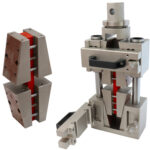
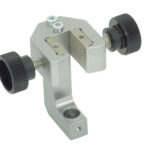
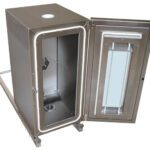
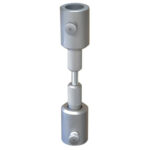
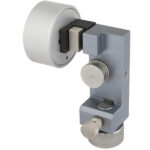
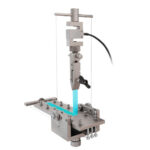
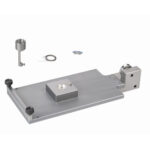
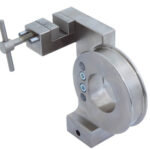
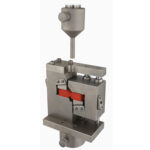
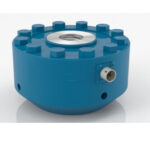
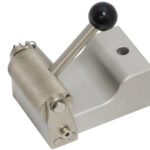
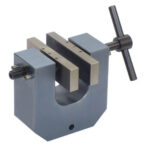
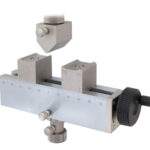
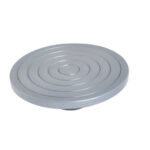
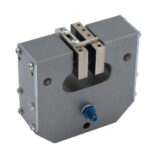
Low Cycle Fatigue (LCF) Testing Gripping – FAQs
1. Why is proper gripping important in LCF testing?
Proper gripping ensures accurate load transmission, prevents slippage, and minimizes stress concentrations that could affect the fatigue life of the specimen. It also helps in maintaining precise alignment, which is essential for obtaining reliable test results.
2. What types of grips are used for LCF testing?
Common grip types include threaded grips, collet grips, hydraulic grips, wedge grips, and pin-loaded grips. The choice of grip depends on the specimen shape, material, and test conditions.
3. How does misalignment affect LCF test results?
Misalignment introduces unwanted bending stresses, leading to premature failure and inconsistent fatigue life predictions. It is crucial to ensure axial alignment within tight tolerances to achieve repeatable results.
4. What factors should be considered when selecting grips for LCF testing?
Key factors include the specimen geometry, material properties, applied load levels, and testing environment. The grip material and surface treatment also play a role in ensuring a secure hold without damaging the specimen.
5. How do MIC Labs ensure optimal gripping in LCF testing?
MIC Labs uses precision-machined grips tailored for different test requirements. The lab follows strict alignment protocols, uses high-quality grip materials, and ensures compliance with ASTM E606 and ISO 12106 standards to deliver accurate and repeatable results.
Looking for tensile testing services in India? Get accurate, NABL-Certified material testing with advanced Universal Testing Machines (UTMs) today!
Low Cycle Fatigue (LCF) Testing Process
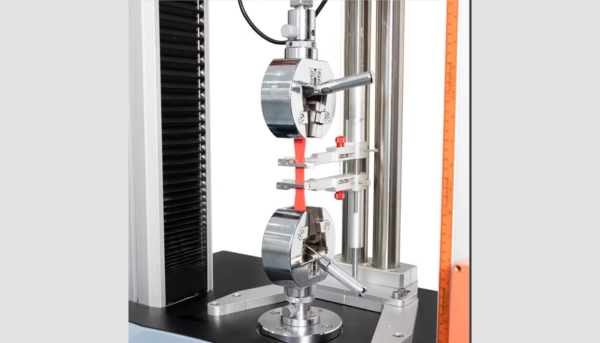
Low Cycle Fatigue (LCF) testing is used to evaluate the durability and failure characteristics of materials subjected to cyclic loading with high strain amplitudes. This type of testing is crucial in industries such as aerospace, automotive, and power generation, where components experience repeated stress variations over a limited number of cycles.
The process begins with specimen preparation, where test samples are machined according to standard geometries defined by ASTM E606 and ISO 12106. The specimen must meet strict dimensional tolerances to ensure repeatable test results. Once prepared, the sample undergoes gripping, where it is securely held using a suitable grip type to prevent slippage and ensure uniform load distribution. Proper alignment is critical to avoid introducing unwanted bending stresses.
The actual LCF test is conducted using a servo-hydraulic or electromechanical testing machine. The specimen is subjected to cyclic loading under either strain-controlled or force-controlled conditions. Strain-controlled testing is more common in LCF, as it replicates real-world plastic deformation scenarios. The test parameters, including strain range, frequency, and temperature, are set according to the test standard or specific application requirements.
During the test, the material undergoes plastic deformation, gradually accumulating damage with each cycle. The test continues until the specimen fails due to crack initiation and propagation. The number of cycles to failure is recorded, and stress-strain hysteresis loops are analyzed to assess fatigue life. Advanced LCF tests may also include high-temperature testing, simulating extreme operating conditions to study material behavior under thermal and mechanical stress.
After testing, the failed specimen is examined for fractographic analysis to determine failure mechanisms such as crack initiation sites, propagation patterns, and material defects. This analysis helps in understanding the fatigue performance and improving material selection for critical applications.
At MIC Labs, LCF testing is performed with state-of-the-art equipment, ensuring accurate, repeatable, and standards-compliant results for various industries.

Low Cycle Fatigue (LCF) Testing Process – FAQs
1. What is the purpose of Low Cycle Fatigue (LCF) testing?
LCF testing evaluates the durability of materials subjected to cyclic loading with high strain amplitudes. It helps determine the number of cycles a material can withstand before failure, making it essential for industries like aerospace, automotive, and power generation.
2. How is LCF testing different from High Cycle Fatigue (HCF) testing?
LCF testing involves high strain amplitudes and plastic deformation, leading to failure in a lower number of cycles (typically less than 10⁵ cycles). HCF testing, on the other hand, uses low strain amplitudes and primarily elastic deformation, resulting in failure after a higher number of cycles.
3. What are the key steps in the LCF testing process?
The LCF testing process includes specimen preparation, gripping, cyclic loading under strain or force control, failure analysis, and fractographic examination to study crack initiation and propagation.
4. What standards are used for LCF testing?
The most commonly followed standards for LCF testing include ASTM E606 and ISO 12106, which define the test methods, specimen geometries, and data analysis requirements.
5. How does temperature affect LCF testing?
Many components experience cyclic loading at elevated temperatures, which accelerates material degradation. High-temperature LCF testing simulates real-world conditions, helping industries assess material performance in extreme environments, such as turbine engines and power plants.
Looking for tensile testing services in India? Get accurate, NABL-certified material testing with advanced Universal Testing Machines (UTMs) today!
Registration & Certifications
Synergistically incentivize effective imperatives through fully researched intellectual capital. Appropriately fashion client-based.
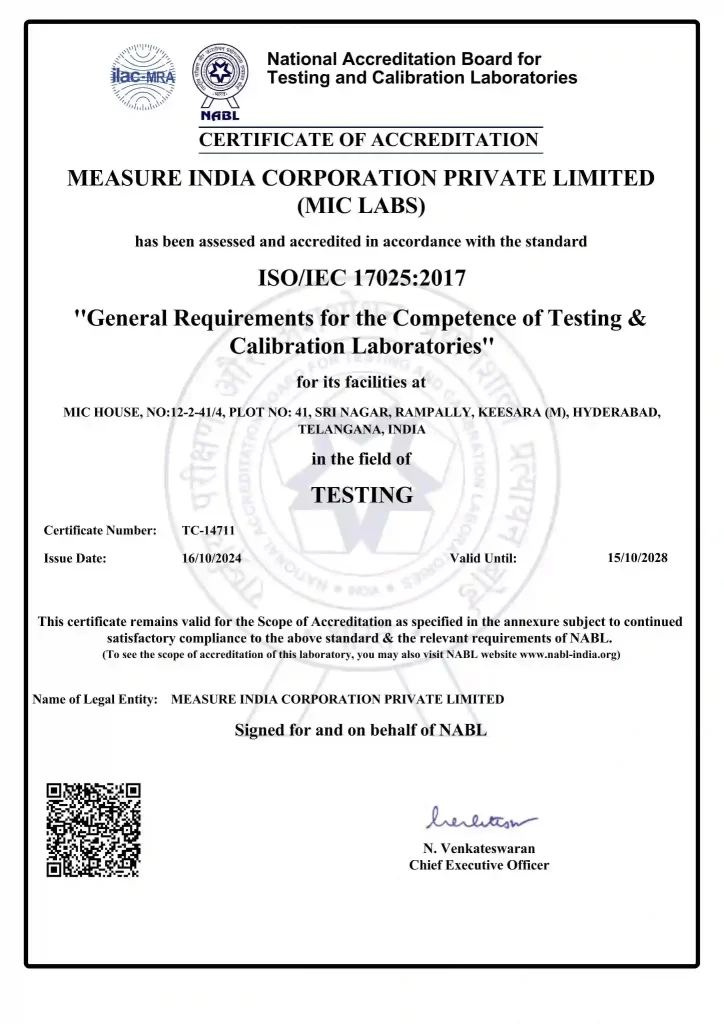
Accredited by NABL
(National Accreditation Board for Testing and Calibration Laboratories – India)
Our laboratory is accredited by NABL as it meets international standards for quality and competence. It operates in accordance with ISO/IEC 17025:2017. NABL accreditation is recognized both nationally and internationally, ensuring the laboratory’s technical competence, impartiality, and reliability.
If you are looking for NABL-accredited testing laboratories in India, our facility provides high-precision testing services in compliance with global quality standards.
Tensile Testing (Standards: ASTM E8M, ASTM E21, ASTM B557M, ASTM A770, ASTM D3039M, IS 1608 Part-1, IS 1608 Part-3, ISO 6892, ASTM D412, ASTM D638)
Compression Testing (Standard: ASTM D575)
Bend Testing (Standards: ASTM E290, IS 1599)
Low Cycle Fatigue Testing (Standard: ASTM E606)
High Cycle Fatigue Testing (Standard: ASTM E466)
Fatigue Crack Growth Rate Testing (Standard: ASTM E647)
Fracture Toughness Testing (K₁C) (Standard: ASTM E399)
Fracture Toughness Testing (J₁C) (Standard: ASTM E1820)
Creep & Stress Rupture Testing (Standard: ASTM E139, E292)
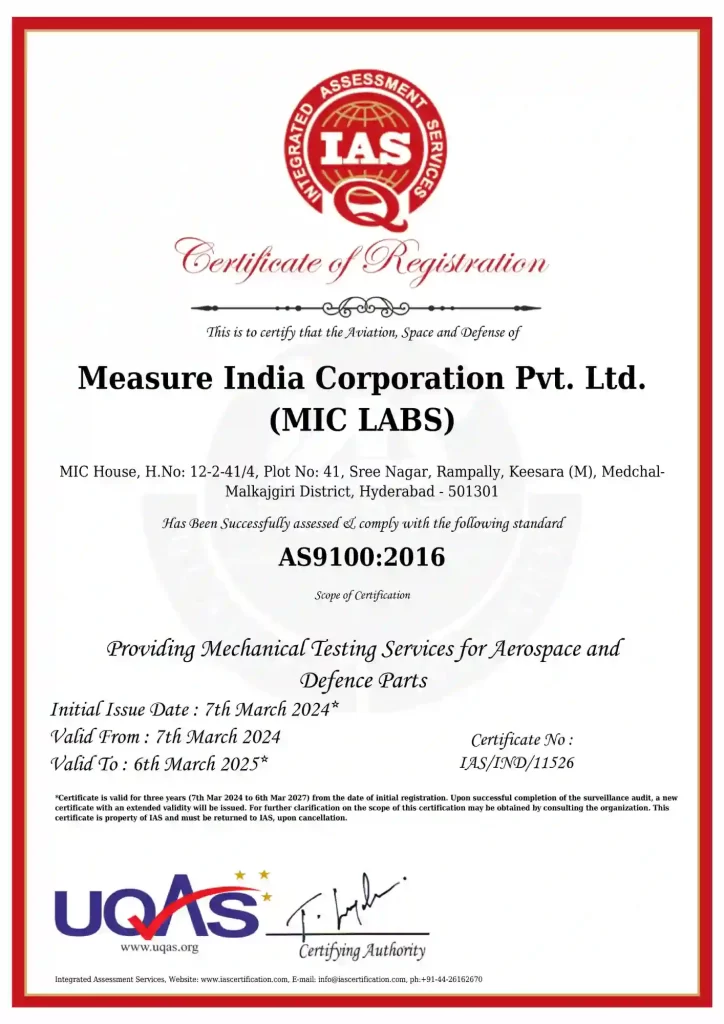
AS9100:2016 Certified
( Integrated Assessment Services )
MIC Labs is certified by IAS in accordance with AS9100:2016, meeting international standards for quality and competence. AS9100:2016 is recognized both nationally and internationally, signifying a laboratory’s technical competence, impartiality, and reliability.
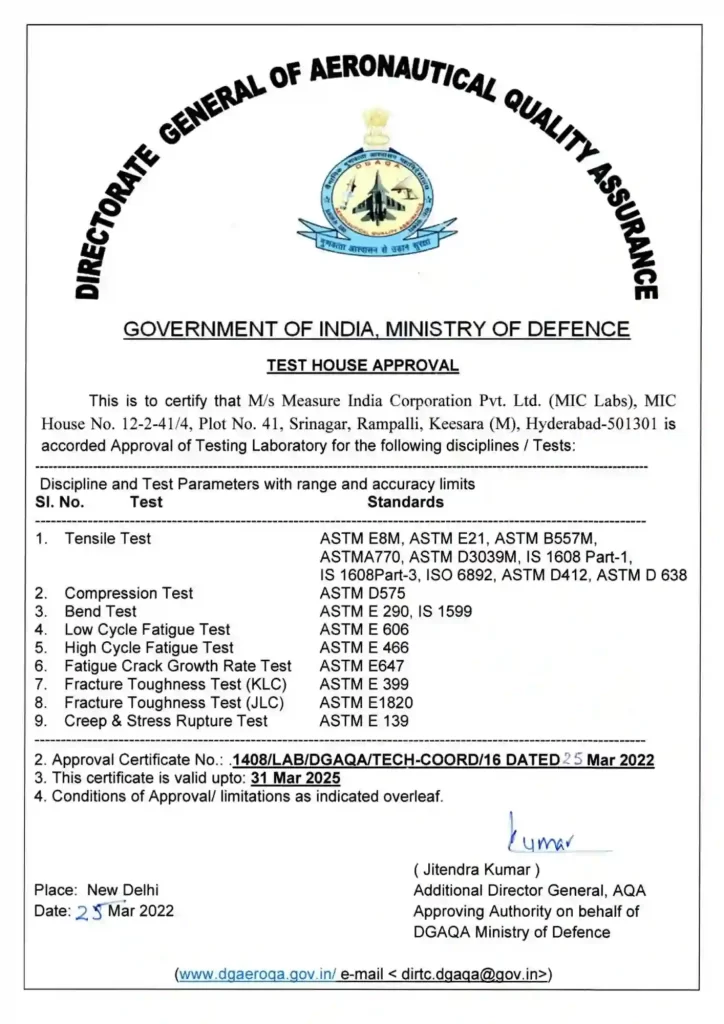
Approved by DGAQA
( Directorate General of Aeronautical Quality Assurance )
MIC Labs is approved by DGAQA ensuring that our laboratory meets the stringent standards required for testing in the aerospace and defense sectors. This approval reflects our technical competence and commitment to delivering reliable and precise results.
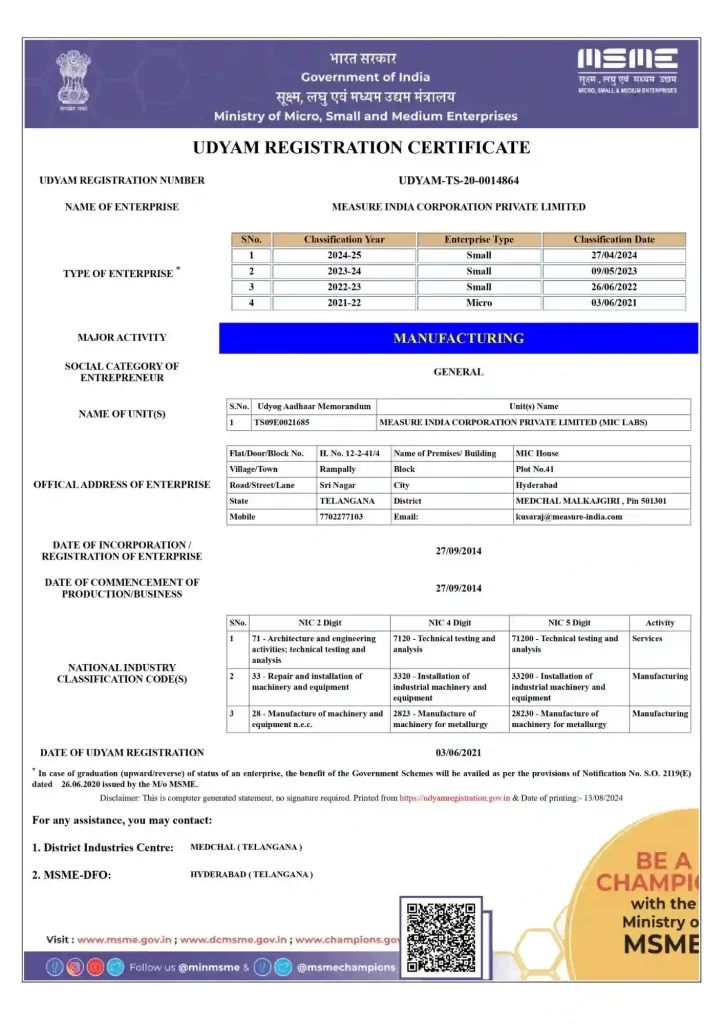
Registered by UDYAM
Measure India Corporation Pvt Ltd is UDYAM registered, recognizing us as a legitimate micro, small, or medium enterprise (MSME) in India. This registration highlights our commitment to quality and compliance with industry standards.
Why Choose Us
We have 20 years of experience in providing material testing systems and offering testing services with great confidence.
- 90+ Products
- 500+ Customers
- 35+ Team Size
- Expertise in guiding and working with top-notch researchers and engineers
- World-class mechanical testing laboratory
Mechanical Testing Lab Services & Universal Testing Machines Suppliers in India
“With over 20 years of experience, Measure India Corporation Pvt Ltd supplies Universal Testing Machines & mechanical testing services, ensuring precision, reliability, and compliance with ASTM, ISO, and global standards across various industries.”
Customer Satisfaction
Business Growth Every Year
500+
Active Clinets

Trusted Clients



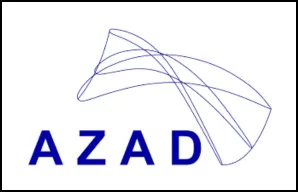





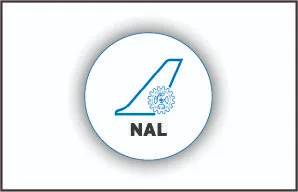
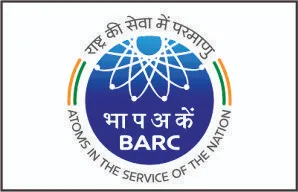
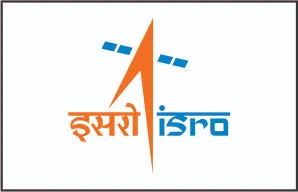
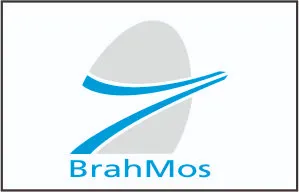
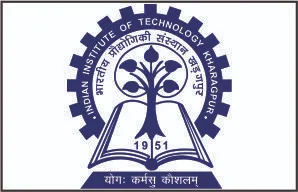
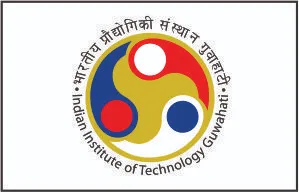
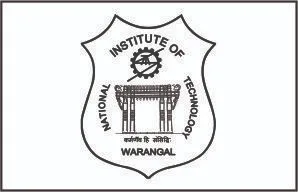


Brands We Deal



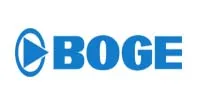


Call us Now
For Universal Testing Machine: +91 99899 21114
Air Compressors: 96767 43939
Material Testing Laboratory : +91 91000 44532
Email Us
Email: info@measure-india.com
Opening Hours
From Monday – Saturday
9:00 am to 5:30 pm
Our Location
MIC House, Plot No 41, Srinagar, Rampally,
Hyderabad, Secunderabad, Telangana 501301
Get In Touch With us
We value your inquiries and feedback! Please fill out the form below, and a member of our team will respond to you promptly.
